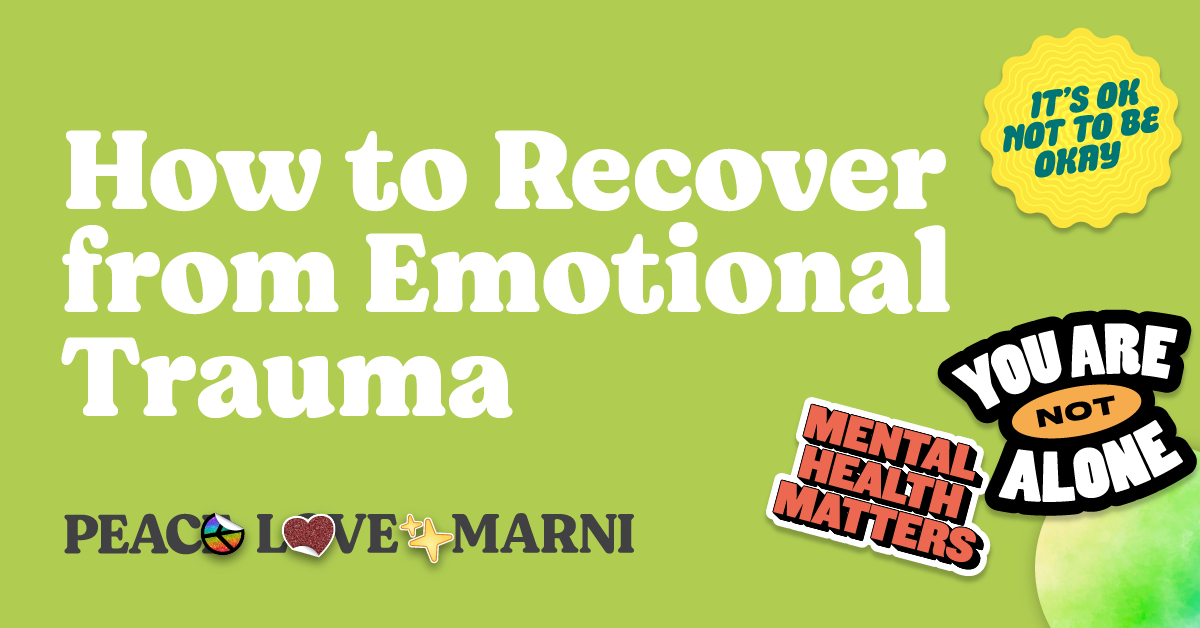Emotional trauma is something people may experience throughout their lifetime. This type of psychological trauma occurs for a variety of reasons. Emotional trauma can have long-lasting effects on those who experience it.
If you experience emotional trauma or have loved ones who do, it’s important to know what causes this pain, the symptoms associated with it, and how to recover from emotional trauma.
What Causes Emotional Trauma & Post-Traumatic Stress Disorder?
Emotional trauma is a broad term covering traumatic experiences. When you suffer from emotional and psychological trauma, you likely experienced certain stressful events that caused mental distress.
According to the NHS, one in three people who experience severe trauma will develop post-traumatic stress disorder (PTSD). PTSD can occur after one or continuing traumatic events. Events do not need to involve physical harm to be traumatic.
Psychological pain can be caused by:
- Specific accident
- Traumatic injury
- Violent attack (even if we are not direct victims, continuing exposure in the news or online can also impact our nervous system)
- A continual stress-causing event, such as poor living conditions or serious illness
- The sudden death of a loved one
- Break-up of a significant relationship
- Surgery (this one one of many commonly overlooked causes)
- Natural disasters
- Domestic violence
- An unstable and unsafe environment
- Separation from a parent as a child
- Childhood trauma, commonly due to abuse in family relationships
Each case of emotional trauma is unique in its situation. Psychological trauma can be long-term or of a shortened nature. Symptoms can disrupt one’s life and affects one’s physical and mental health and wellbeing.
What Are the Symptoms of Emotional Trauma?
The symptoms of emotional trauma are varied. Each individual who suffers a disturbing event will experience different results. Everyone has different traumatic memories, and thus, PTSD will look different on everyone.
Remember that your physical and emotional reactions are normal. You are not alone!
Emotional & Psychological Symptoms
These are completely normal reactions. Even if the trauma happened years ago, it can still have an impact on your mental health and well-being today.
These are some common emotional symptoms of emotional trauma and PTSD:
- Confusion
- Difficulty concentration
- Feelings like shock, denial, disbelief, confusion
- Mood swings
- Anxiety
- Difficulty concentrating
- Anger
- Irritability
- Fear
- Guilt
- Self-blame
- Withdrawing from interactions with others
- Feeling shame, sad and hopeless
- Feeling disconnected
- Feeling numb
Physical Symptoms
Trauma affects your body’s natural equilibrium. You may experience some physical symptoms after traumatic events. These common reactions to abnormal events include:
- Nightmares
- Fatigue
- Startling easily
- Insomnia
- Racing heartbeat
- Aches and pains
- Panic attacks
- Painful memories and flashbacks
These symptoms can last days, weeks, months, or longer. And they may only be a few symptoms at first but grow in number as the recollection of the trauma persists.
It’s important to note that no two experiences are the same. What one might experience due to a traumatic event may not occur with another person who experiences the same trauma.
Whatever the symptoms may be, there are no right or wrong ways for a person to respond to something they’ve been through that causes emotional and psychological pain for them. Your subjective emotional experience determines if something was traumatic – your pain is valid!
Can You Fully Recover From Emotional Trauma?
When you suffer from emotional trauma, you might feel helpless as you start your trauma recovery. There is no set time limit for pain and suffering. Every individual reacts to trauma differently. The symptoms are different as is the length of time it takes for recovery to occur.
How quickly you can heal from trauma depends on many factors:
- Type of emotional trauma
- The extent of psychological trauma
- Symptoms resulting from the traumatic event
- How the person deals with trauma as an individual
- Any additional factors that compound the trauma
Remember, you are not responsible for the actions that caused your suffering. You can only heal at a time when you’re ready to do so.
Don’t stress if the mental health recovery process takes longer than you might expect. Know that you have the power and strength to get through this emotional trauma.
How Do You Overcome Emotional Trauma?
Now that you know what causes emotional trauma and the symptoms of the distress, it’s time to learn how to overcome this trauma.
There are many ways to deal with a traumatic event and its aftermath. These effects can be long-lasting and extremely detrimental, especially if you don’t deal with them. If the symptoms of the trauma are left to continue, they may worsen as time goes by.
Fortunately, there are many ways to help people recover from emotional trauma. We highly recommend trauma survivors seek professional help for the best recovery process. Trained professionals can guide you through Eye Movement Desensitization and Reprocessing (EMDR) or Cognitive Behavioral Therapy (CBT). These types of therapies can help you through the healing process.
Here are some additional ways you can manage upsetting emotions with self-care:
Exercise to Boost Endorphins
Exercising for even just 30 minutes a day is an excellent way to help diminish emotional trauma and the symptoms you experience from it. Exercise and movement will help you burn off adrenaline and release endorphins, which can reduce stress.
When you exercise, try to move your entire body, especially both your arms and legs. Do something you enjoy! Not only will you reap the health benefits of the exercise, but you’ll also have fun doing it.
Focus on a mind-muscle connection while doing exercises like yoga, weight training, or running. When you are mindful of your body movements, you’re putting your focus on something other than the traumatic event you experienced in the past.
Don’t Isolate Yourself After a Traumatic Event
During your recovery, you may be tempted to isolate yourself from others. Maybe you don’t feel like socializing or you want to just keep to yourself for a while.
Surround yourself with trusted family and friends. You don’t have to talk about what has happened to you if you don’t want to.
If you want to talk about the traumatic experience with others who had a similar or the same experience, join a support group. There are many support groups available on a wide array of topics. You can choose the group you will best relate to and gather with others who understand what you’ve been through.
Be Mindful of Your Nervous System
Your fight or flight reflex is tied to your nervous system. This can become impaired when suffering from post-traumatic stress disorder (PTSD).
But there are ways you can help yourself through certain agitations or anxiety. When you learn how to calm yourself through relaxation techniques, you have a solution when thoughts of your trauma pop up and you want to keep them subdued.
Here are some ways to provide a soothing atmosphere for yourself:
Practice Breathing Techniques
Breathing techniques are a great way to calm down with ease. When you engage in patterned breathing you can relax and produce a calming reaction.
Mindful breathing of this type is easy to do. And it only takes a minute to do so. For 60 seconds, take regular breaths and focus on each inhale and exhale as you go along. Take steady breaths for 60 seconds and you’ll likely find you feel calmer and more at ease once the minute is up.
Stay Grounded
Another way to calm your nerves is to feel grounded. When you’re grounded, it can help push back intense feelings and negative emotions. Practicing a grounding technique reminds you that you are in a safe place now.
An example: Sit in a chair with your feet flat on the floor. Sit up straight. Look around the room and try to find every object that is a specific shape or color. Try to count them all.
Use Your Senses
Are there certain sights, smells, or tastes that make you feel at ease? If so, you want to use your senses and accentuate this calmness.
Some people find that listening to music calms them. Others might discover that drinking certain teas produce a calming sensation. This can help you find an emotional balance.
Be Mindful of Your Health
Symptoms from traumatic events may adversely affect your health. When you suffer from the result of a traumatic event, your mental and physical health can be put at risk.
In order to stay as healthy as possible as you deal with the aftermath of a traumatic event, keep the following tips in mind for your physical and mental health:
Make Sure You Get Enough Sleep
A good amount of sleep is essential all the time, but especially if you’re dealing with personal trauma. A traumatic event can alter your sleep patterns, as the worry or fear you experience prevents you from getting a good night’s sleep.
The more sleep you get, without overdoing it, will help your body to recharge. It will also give your mind a rest so you’re not constantly dwelling on the bad prior event.
Try to get 7-9 hours of sleep each night so your body and mind can recharge.
Don’t Drink
Alcohol can worsen traumatic symptoms and increase the anxiety and depression you feel. Although you might feel like alcohol helps you cope with your symptoms, you should never use this as a coping mechanism. Alcohol will do more harm than good.
Therefore, avoid alcohol whenever possible. You’ll be able to clear your mind and improve your symptoms with healthy alternatives.
If you are struggling with substance or alcohol abuse, call the Substance Abuse and Mental Health Services Administration (SAMHSA). SAMHSA has a national hotline for treatment referral and information. You can give them a call at 1-800-662-HELP (4357).
Focus on Stress Management
When you’re in the process of recovering from emotional trauma, keep stress to a minimum. Practice various stress-relieving techniques such as breathing exercises, meditation, and yoga. Self-care is extremely important as you recover!
You can also relieve stress by taking part in your favorite hobbies and pastimes. When you put the focus on something else, you can take the spotlight off the stressful event.
Add Mood-Boosting Foods to Your Diet
Eating a healthy diet will also help you to keep your energy at a maximum level and make mood swings less likely. When you eat healthy foods, such as ones rich in Omega-3 fats, you’ll gain an elevated mood. This is helpful when you may not be feeling like yourself after experiencing psychological and emotional trauma in your life.
Psychological Trauma Doesn’t Have to Rule You
With all this in mind, know that emotional and psychological trauma doesn’t have to rule you. A major way to help yourself heal is to move on with your normal routine. Staying busy in your day-to-day life can help you feel more in control.
Know that you can make healing changes and that you are not alone. It can feel hard to move beyond painful past memories. Just take one step at a time as you focus on your mental health.
If you are feeling hopeless and need immediate help, you can call the National Suicide Prevention Lifeline at 1-800-273-TALK (8255).







